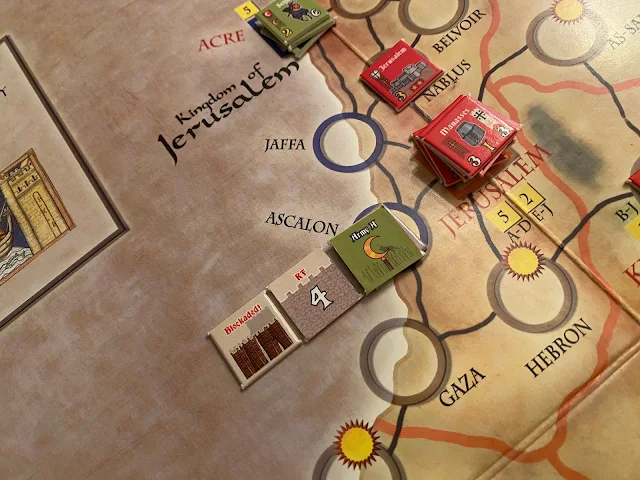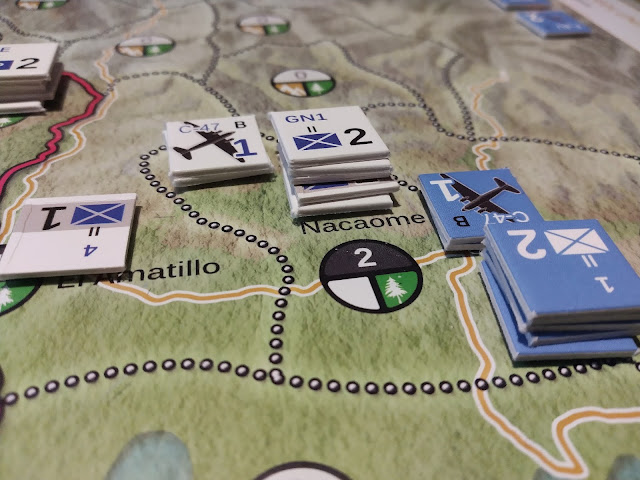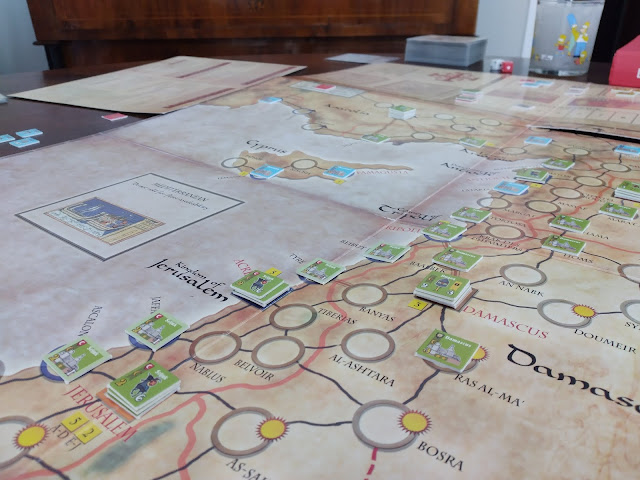Kingdom of Heaven. Antioch and other misfortunes: the Second Crusade
Scenario B, "Quantum Praedecessores: The Second Crusade".
Cristiana: Laura Beltrami
Muslim: Alex Isabelle
Forty-five years. Almost half a century has passed since the end of the First Crusade, with which, as we have seen in the report of the first scenario, the whole Christian world had reasons to doubt that the reconquest of the holy land was pleasing to the eyes of the Most High. The history of the Crusades, however, is made up of celestial visions, annihilating glories, romantic failures. In short: the soul of Man is not made to give in easily - is this not perhaps one of his qualities? - and, in the case of valiant warriors of high ideals, certainly not at the first misstep. So here is that the first experiment is followed by another: a Second Crusade through which it will be possible to amend the faults and errors of the first one.
 |
| Muslims prepare an action plan |
Kingdom of Heaven is generous, because each game is a case by itself: the scenario setup is always historical and does not take into account the outcome of the previous games. So here's how things went in canonical history: the Crusaders won the First Crusade and spent some time consolidating their power in the territory. Bohemond, the one who died in our "epidemic" outside the walls of Antioch, set up the Principality of Antioch, where his heirs now reign. Further south, Raymond the Syphilitic helped to establish the County of Tripoli, only to die before seeing the completion of the works. The Kingdom of Jerusalem, which it was hoped would be left without a King after Raymond's refusal to take the crown, was instead taken over by Godfrey of Bouillon, one of the superstists of our previous game.
Over the next thirty years, the war never stopped, and Christians continued to erode, little by little, the Muslim possessions, creating the so-called Crusader States. This went on until the 1940s, that is, until the Byzantine Emperor John II showed up in Antioch and took control of it for a while, only to die in 1143 and create a vacuum of power such as to give the Seljuk Turks, now led by 'Imād al-Dīn Zengī (the new Atabeg of Mosul), the possibility of hitting hard the Crusader States.
We note that it is always the Orthodox who create the conditions for a Muslim invasion, and that Antioch is always the scourge of the Crusader leaders. Whatever, this is our setup: we are in 1144 and Zengī, with a good army in Mosul, is preparing to ride towards the unguarded city of Edessa. The second crusade has not yet been called, but it will be if the Seljuks expand their borders beyond the current ones.
 |
| The sieges of Edessa and Aleppo |
And the opening move that starts it all is... Zengī's death. The Muslim player himself plays the card that causes him to be murdered at the hands of a eunuch slave. The succession, which historically has been complicated, in our case is immediate: to take his place comes his son Nūr al-Dīn, a leader who has all the numbers to own the Christian forces with the violence of a devil. Immediately he leaves for Edessa, as his father wanted to do, and besieges it.
The Count of Edessa, Joscelyn II, is not at home. In nearby Antioch, aware that the city is destined to fall, he is already organizing the counterattack. While Nūr al-Dīn proceeds to occupy his city he, together with the Count of Tripoli Raymond II and the Prince of Antioch Raymond of Poitiers, therefore marches towards the city of Aleppo, at this moment marked by certain disorders fueled by the Shiite minorities and defended only by a unknown "emir". Wikipedia reveals that this one is probably Asad al-Dīn Shīrkūh, Atabeg of Aleppo, Nūr al-Dīn's main general and even Saladin's uncle, who in this historical moment is still an infant.
 |
| The pool of Seljuk forces waiting to be deployed at the beginning of the turn. Notice Raymond of Poitiers, held captive |
While the siege of Edessa proceeds swiftly (also due to the lack of a leader to manage the troops within the walls), that of Aleppo is an Odyssey. The besieging troops are few, even if valiant - among them there are some Hospitallers - and they risk being reached by the forces of Nūr al-Dīn, a fact that feeds the enthusiasm of the defenders. In the course of some skirmishes some Christians have already leave this world. Meanwhile, Edessa falls. It is at that point that Nūr al-Dīn actually marches with his men towards Aleppo; in a bloody battle he destroys the Christian forces engaged in the siege. Nobody will be saved from the butchery. Two of the leaders themselves, Jocelyn II and Raymond II, are put to the sword while Raymond of Poitiers is captured. The news of the crushing Muslim victory spreads like wildfire throughout the Crusader States and beyond, even reaching the ears of Mu'in al-Din Unur, governor of Damascus.
Damascus has so far remained neutral. However, upon receiving news of this battle, Unur realizes that this could be the right time to join the games and participate in the reconquest of the Crusader States by forging an alliance with the Turks. Having received the Seljuk diplomat, at the end of 1144 he accepts Nūr al-Dīn's proposals. He will participate in the war, albeit leaving an openness to dialogue also with Christians, in the event that this could prove useful to him.
At the dawn of 1145, therefore, the Muslim league gets enriched with Seljuk reinforcements and by the Damascene units. Nūr al-Dīn leaves Mosul, where he had returned during the winter demobilization, reaching Shīrkūh, who had remained in Aleppo. Together the two head to Antioch, which is very close, but decide to make a short stop at the small fort of Gaston, a castle built by the Principality of Antioch near the border. The latter, lacking a garrison worthy of the name, surrenders immediately. From being a defensive point of Antioch it therefore becomes a safe haven for the Seljuk, who reinforce its defenses and then continue towards the capital.
 |
| The flurry of events that solved the siege of Antioch |
A siege lasting a few months follows. The port of the city is blocked, and while the Muslims dig under the walls, working hard to create a passage leading them into the city, the wells of the latter dry up and the rats infest its food reserves. Even if the troops inside it are numerous, they are without a leader who commands them, and their resistance is exhausted due to the hardships to which they are reduced. Therefore, within a couple of assaults, Antioch falls.
Here begins a new diplomatic game, a push and pull between the Seljuk and the Emirate of the Fatimids, which, exactly as in the previous scenario, control Egypt and are completely neutral. Nūr al-Dīn, after the conquest of Antioch, believes that this adventure should be enough to convince the Fatimids that the cause against the Christians is acceptable to the Lord. A diplomat is sent, but he is sent back to Mosul empty-handed. The Fatimids do not want to be involved in this.
While this is happening, in an attempt to intervene on the fate of the city, Manasses of Hierges, constable (i.e. first officer) of the Kingdom of Jerusalem, currently presided over by Queen Melisenda, moves north. After gathering a moderate group in the north of the Kingdom, he heads straight for Damascus, currently defended only by the poorly trained Damascus troops and by Unur. To break the siege Nūr al-Dīn intervenes once again eliminating the Christian forces and capturing Manasses.
Like their leaders, the capitals of the Crusader States have almost all fallen into Muslim hands during these two years of jihad. Only Tripoli, Jerusalem and Acre are fine. Nūr al-Dīn, who now believes he has an easy game despite the hesitations of the Shiites, gathers a handful of troops and reaches Tripoli, besieging it together with the forces of Unur. Meanwhile, Christians are reorganizing. A ransom is organized for Manasses and Raymond. At the same time, Queen Melisenda of Jerusalem contacts the Pope urgently asking that something be done.
A Second Crusade is therefore immediately called, completely analogous to the previous one. The main contingent is made up of Franks and Germans, who decide to follow the same path opened almost fifty years earlier by their colleagues. However, even before they arrive, at the end of 1146 a small detachment of crusaders, presumably English being led by a certain Lord James, arrives in Acre. He, with a rather small but decidedly angry handful of crusaders, having gathered under his wing also a band faithful to Jerusalem, lashes out against Nūr al-Dīn's forces, numerically superior but completely unprepared for the fight. The latter must withdraw to Baalbek, in the direction of Damascus. Tripoli, for the moment, is safe.
1147 is apparently the year of the turning point. The Second Crusade actually begins. As mentioned, a large contingent of Franks and Germans, led by Conrad I and Louis VII, comes passing through Constantinople. Historically, the crossing of Turkey was a bloodbath, but in this case the dice have leniency, allowing the Crusaders to arrive fairly unscathed as far as Lower Armenia. At the same time, Muslims conduct new negotiations with the Fatimids, pointing out that these Christians are a problem that must be eradicated at the root, but they again don't want to be involved in the war.
This is also a year of great maneuvers. We finally reach an open clash only in 1148, when the crusaders, gathered the forces of Antioch in Alexandretta, set out towards Edessa, encircling it in a siege whose destiny is marked since the beginning. Since the troops of Lord James and Manasses have basically barricaded themselves in Jerusalem, however, Norandino rides back to Tripoli, and orders the immediate surrender of the city. When Edessa falls, returning to fly the Christian flag, Tripoli goes back to being Muslim. The latter is worth less victory points, but it is still a decent diversion, as well as a useful mortgage on the game in the event that Damascus were to change side of the barricade, a fact that would lead to a significant hemorrhage of points for the Seljuk.
The fall of Tripoli, among other things, does not go unnoticed in the Muslim world, and for the third time the Seljuks ask the Fatimids for a meeting. Nothing to do: again, they refuse. The Christians in the meanwhile continue with their reconquest, and head towards Antioch.
 |
| The pile of Catholic and Orthodox carcasses. Higher up, in jail, Shīrkūh |
Once again the latter turns out to be the scourge of the Crusaders: the siege, although destined to be won by the crusaders, is unfortunately long. In defense of the city there is a decent contingent of troops led by the brave Shīrkūh, whose value gives hope to the soldiers barricaded inside the walls. Bad luck wants, among other things, that the Christian leaders presented themselves in Antioch with a particularly poor hand of ideas on how to actually take the city, which resists gloriosly until the half of 1149. Shīrkūh is captured.
Leaving aside the north of the region, Nūr al-Dīn meanwhile continues in his adventures, managing to conquer even a deserted Acre, and addresses the Fatimids a last appeal to mutual interest. The latter, also because of the counter-diplomacy operated by Christians, for a fourth time do not want to be involved. At this point Nūr al-Dīn has enough and, seeing that the game is basically won already, he invades the Shiite territory, attacking Ascalona, a Fatimid fortress, so as to kill some asshole, and give an example to the Fatimids' sloth.
Further north the crusaders, already tired from the vicissitudes of the siege of Antioch, are unable to continue towards Aleppo, and symbolically resort towards that fort of Gaston which had been conquered by Nūr al-Dīn in 1145. However, they will not be able to reconquer it.
At the conclusion of the operations, therefore, although the Crusader counterattack was able to bring Edessa and Antioch back to order, Tripoli and Acre are Sunni property. This would be enough to mark the Seljuk victory, even if only slightly. However, the support of Damascus, initially hesitant and then decided, brings to the Muslim faction that handful of extra victory points to definitively confirm the defeat of this second crusade.
Do you want to read other stories? Click here for the full list.






Comments
Post a Comment